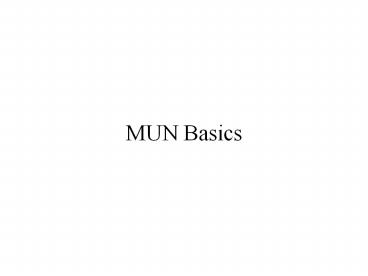MUN Basics - PowerPoint PPT Presentation
Title: MUN Basics
1
MUN Basics
2
Committee Procedure
- Motion to open debate
- Often the chair recognizes the debate as being
opened and this motion is unnecessary - Motion to set agenda
- Motion to open the speakers list
- Motion to set a time limit on speeches
3
Motion to Set Agenda
- The topics are usually set ahead of time. If
there are multiple topics a speakers list is
created to debate the order of the agenda. - Once debate is exhausted a vote is taken on the
order in which the topics will be debated.
4
Motion to Open the Speakers List
- All nations wishing to be on the speaker's list
raise their placards or write a note to the
chair. - During debate Delegates may send a note to the
chair at any time requesting to be added to the
speakers list, as long as the Delegate is not
already on the list.
5
Limitation of Speaking Time
- Any Delegate may motion to limit the time allowed
to each speaker. - Two speakers may speak in favor of the proposed
time, and two against. - A majority vote is required to set a speaking
time.
6
Quorum
- When committee is in session it may enter three
different forms of debate - Debate
- Moderated Caucus
- Unmoderated Caucus
7
Debate
- After the agenda has been determined debate will
follow the speakers list. - Speakers may only discuss the Topic Area being
considered - Speakers may only address and resolution
currently on the floor.
8
Moderated Caucus
- Any Delegate may motion to enter Moderated Caucus
(aka Informal Debate) when the floor is open. - The Delegate must set a time limit for the
Moderated Caucus (not to exceed 15 minutes), and
a speakers time (not to exceed 1 minute). - The motion requires a majority to pass.
- Speakers will be recognized by the chair.
9
Unmoderated Caucus
- A Delegate may move for an unmoderated caucus
(aka suspension of the meeting) when the floor is
open. - The Delegate must explain the purpose of the
caucus and a time limit not to exceed 15 minutes
(20 minutes Harvard). - Motion requires a simple majority to pass.
10
Procedural Points
- Point of Order
- Point of Parliamentary Inquiry
- Point of Information
- Point of Personal Privilege
11
Point of Order
- Used to correct a mistake in the parliamentary
procedure. - During the discussion of any matter a Delegate
may rise to a Point of Order - Delegate may not speak on the substance of the
matter, just the rules.
12
Point of Parliamentary Inquiry
- Used to inquire about proper procedure. The chair
will rule and explain. - Delegate may rise to this point if there is no
discussion on the floor - Also known as Point of Parliamentary Procedure
13
Point of Information
- Used to correct or ask some information.
- Harvard does not use Points of Information
14
Point of Personal Privilege
- Used to alleviate a personal discomfort or
distraction that impedes your participation in
debate. (noise, room temperature, volume,
movement, etc.) - Delegation may rise to this point at any time
15
The Yielding of Time
- At the conclusion of a delegates speech he or
she must yield any remaining time. - Yield to another delegate
- Yield to questions
- Yield to the chair
16
Yield to another Delegate
- A Delegate may yield his or her remaining
speaking time to any other delegate. At this
point the Chair will recognize that delegate for
the remaining time. - Once yielded to a delegate may not make another
yield. - A yield is not required to turn the floor over to
a co-delegate of the same member state.
17
Yield to Questions
- A Delegate may yield his or her remaining time to
answer questions. - Questioners will be selected by the Chair, and
limited to one question each. - Follow-up questions are not allowed.
- Time is deducted only from the answers, not the
questions themselves.
18
Yield to the Chair
- If the delegate does not want to be subject to
comments or questions he or she may yield to the
Chair. Debate will simply move to the next
speaker on the list.
19
Comments
- If a speech uses the entirety of its allotted
time, and no yields are made, then two 30 second
comments are in order. - The Chair will recognize the two speakers, who
may not yield their time.































